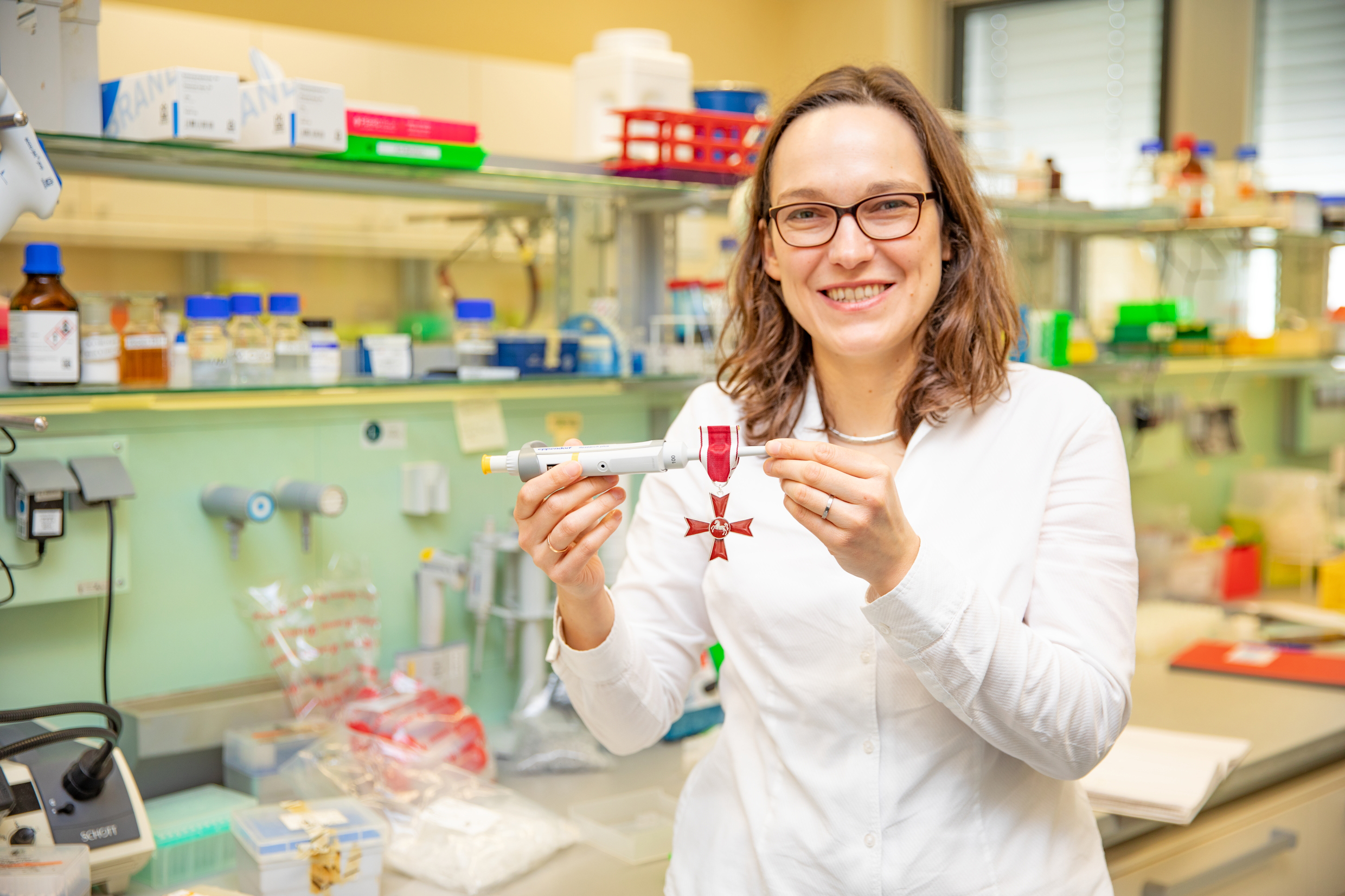Order of Merit honours the rheumatologist's commitment for her research work on the corona vaccination and Long COVID as well as her commitment to the medical care of refugees

Honoured for many reasons: Professor Dr Alexandra Dopfer-Jablonka has received the Lower Saxony State Cross of Merit. Copyright: Karin Kaiser / MHH
Professor Dr Alexandra Dopfer-Jablonka has been working at the Department of Immunology and Rheumatology at Hannover Medical School (MHH) since 2011. Since then, the senior physician has been exceptionally committed to helping refugees, both on a voluntary basis and as part of her research activities, and has rendered outstanding services in dealing with the COVID-19 pandemic. The development of treatment concepts to combat the long-term consequences of the pandemic (Long COVID) is also largely due to her efforts. The rheumatologist has now been awarded the Cross of Merit on Ribbon of the Order of Merit of Lower Saxony by the Mayor of Hanover, Belit Onay. Onay paid tribute to the great commitment of the physician: "She has always recognised very quickly where global crises have posed challenges for society, and she has responded with great dedication and incredible energy."
"Although I received the Order of Merit, I only see myself as representative of many other people who work with me," emphasises Professor Dopfer-Jablonka. "I would therefore like to thank not only the Ministry of Science and Culture of Lower Saxony, which nominated me for the award, but also my colleagues at MHH in particular for their commitment and support." MHH President Professor Dr Michael Manns was delighted with the award for the rheumatologist: "Professor Dopfer-Jablonka has shown an extraordinary personal commitment to the medical care of refugees and the fight against the pandemic over and above her work at MHH. She thus enriches our image as an internationally visible university with a focus on infection research."
Medical help for refugees
During the 2015 refugee crisis, Professor Dopfer-Jablonka set up medical care for around 15,000 refugees in Lower Saxony and Hamburg. As head of medical operations and deputy head of the command staff for the care of refugees, she not only ensured acute and long-term medical care for the refugees, but also pioneered important research questions on the social impact of migration throughout Europe. For example, the physician worked with various partners to investigate the stresses and strains on migrants during the pandemic. She is currently working on the NU(M)KRAINE project of the Network of University Medicine (NUM) to investigate the diagnosis, treatment and prevention of infectious diseases in refugees from Ukraine.
Commitment to corona vaccinations and against Long COVID
In her research into the SARS-CoV-2 coronavirus, Professor Dopfer-Jablonka has built up one of the world's first and largest cohorts since 2020 with MHH staff as part of the COVID-19 Contact (CoCo) study, working on important issues relating to antibody formation and vaccine protection. The research results obtained in collaboration with her colleague Professor Dr Georg Behrens showed that so-called cross-vaccinations with the vaccines from BionTech and AstraZeneca were more effective than two vaccinations with the vaccine from AstraZeneca. As a result, Germany and other countries changed their vaccination recommendations.
In addition, the physician helped develop vaccination concepts at state level and also made a very specific contribution to the fight against COVID with her work in the vaccination centre or mobile vaccination teams. Since 2021, the senior physician has also been making important contributions to the care of long-term COVID sufferers with the DEFEAT Corona project funded by the European Regional Development Fund (ERDF) and the ErgoLoco project based on it, such as precise procedures for occupational therapy and group psychotherapy.
Text: Kirsten Pötzke